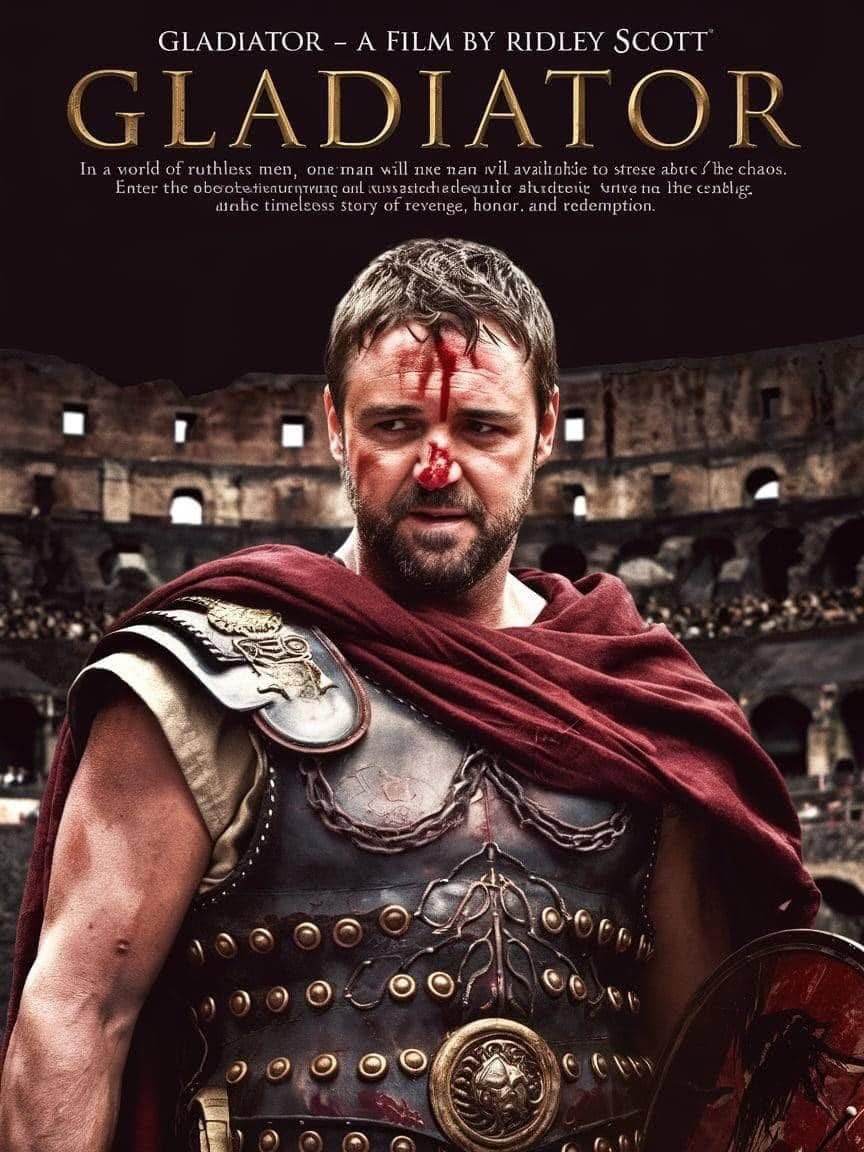Gladiator (2000)

Directed by Ridley Scott and starring Russell Crowe, Gladiator is a monumental epic that redefined the sword-and-sandal genre for the modern age. Released in 2000, the film is celebrated for its sweeping storytelling, powerful performances, and spectacular visuals. It won five Academy Awards, including Best Picture and Best Actor for Crowe, and remains one of the most iconic films of the early 21st century.
Plot Overview
Set in the Roman Empire during the reign of Emperor Marcus Aurelius, the film follows General Maximus Decimus Meridius (Russell Crowe), a loyal servant of Rome who is betrayed by Commodus (Joaquin Phoenix), the Emperor’s scheming son. After Commodus murders his father and seizes the throne, Maximus is condemned to slavery, his family brutally killed. Stripped of his rank and identity, Maximus rises as a gladiator in the Roman arena, plotting his revenge against Commodus while becoming a symbol of defiance and hope to the oppressed.
Themes and Storytelling
Gladiator is a masterclass in blending personal tragedy with epic scale. At its core, it is a tale of redemption, vengeance, and the enduring human spirit. The screenplay, written by David Franzoni, John Logan, and William Nicholson, deftly weaves themes of loyalty, power, corruption, and sacrifice. Maximus’ journey from a celebrated general to a slave and finally to a legend embodies resilience and the fight for justice.
The film also explores the politics of Rome, juxtaposing the decadent, morally bankrupt ruling elite with the raw humanity of the gladiatorial arena. The crowd’s bloodlust and their capacity for adoration reflect the volatile relationship between leaders and the masses—a timeless commentary on power and spectacle.
Performances
Russell Crowe delivers a career-defining performance as Maximus. He balances ferocity and vulnerability, portraying a man who is both a relentless warrior and a grieving father. His line, “Are you not entertained?” has become iconic, epitomizing his ability to command the screen.
Joaquin Phoenix is equally mesmerizing as Commodus, embodying the entitled and insecure antagonist with chilling intensity. His portrayal of Commodus is layered, making him both detestable and pitiable—a villain driven by his yearning for love and recognition.
The supporting cast, including Connie Nielsen as the conflicted Lucilla, Oliver Reed as the charismatic Proximo, and Richard Harris as the wise Marcus Aurelius, provide depth and gravitas to the narrative. Reed’s performance is particularly poignant, as it was his last before his passing, adding an extra layer of resonance to his character.
Direction and Cinematography
Ridley Scott’s direction elevates Gladiator into a cinematic masterpiece. He masterfully recreates ancient Rome with a mix of practical effects and CGI, offering breathtaking vistas of the Colosseum, Roman architecture, and the gritty world of the gladiators. The battle sequences are visceral and intense, capturing the brutality of combat while maintaining coherence and visual elegance.
Cinematographer John Mathieson employs a desaturated color palette that enhances the film’s somber tone, while the dynamic camerawork immerses viewers in the chaos of battle and the grandeur of the Colosseum.
Score and Sound
Hans Zimmer and Lisa Gerrard’s score is unforgettable, blending hauntingly beautiful melodies with stirring anthems that perfectly complement the film’s emotional and epic moments. Tracks like “Now We Are Free” have become synonymous with the film’s legacy, evoking a profound sense of loss, hope, and triumph.
Impact and Legacy
Gladiator revitalized the historical epic genre, paving the way for films like Troy, Kingdom of Heaven, and 300. Its influence extends beyond cinema, inspiring countless references in popular culture and solidifying Maximus as one of the great cinematic heroes.
The film’s critical and commercial success demonstrated the audience’s appetite for emotionally driven, large-scale storytelling. Winning multiple Oscars, including Best Picture and Best Actor, cemented its place in film history.
Criticism
While widely acclaimed, Gladiator has faced some criticism for historical inaccuracies and its relatively straightforward revenge plot. Scholars have pointed out deviations from actual Roman history, and some have labeled its portrayal of gladiatorial combat as overly romanticized. However, these critiques do little to diminish the film’s emotional and cinematic power.
Conclusion
Gladiator is a cinematic triumph, blending powerful performances, breathtaking visuals, and a timeless story of honor and redemption. Ridley Scott’s vision, Russell Crowe’s commanding presence, and Hans Zimmer’s evocative score create a film that transcends its genre to become a cultural touchstone.
Whether you are drawn to epic battles, intricate political drama, or deeply personal stories of resilience, Gladiator offers an unforgettable experience. Over two decades after its release, it remains as entertaining, moving, and impactful as ever—a testament to its enduring greatness.











